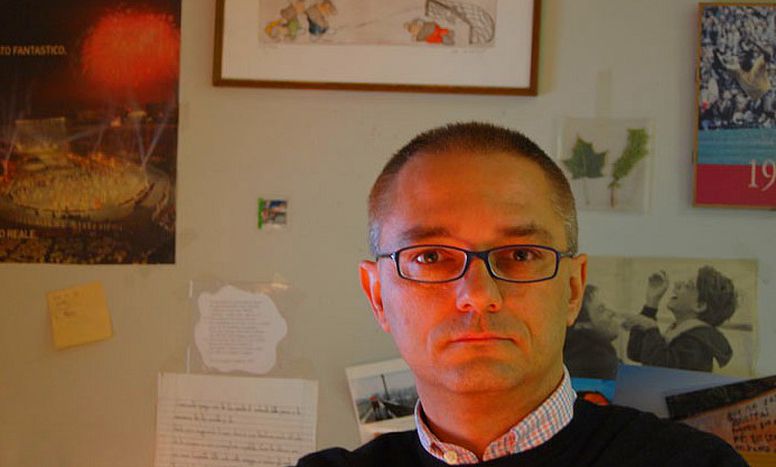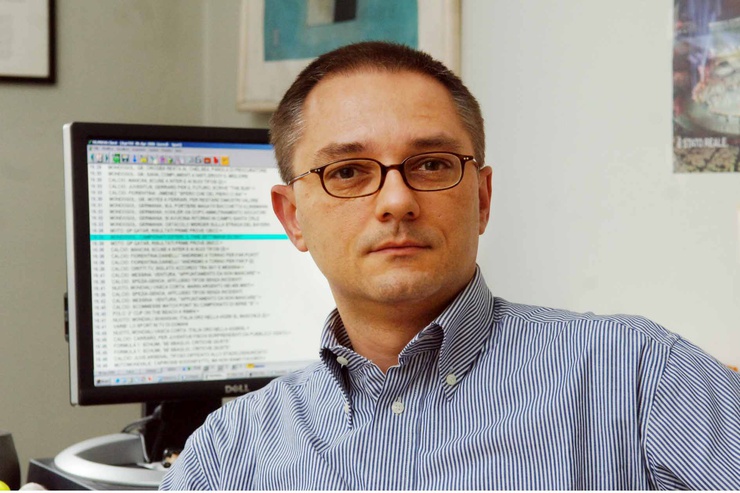
Maurizio Crosetti: ‘Using English words in Italian is a basic lack of respect’
Published on
Translation by:
Mary MaistrelloThe Turin-born sports journalist at national daily 'La Repubblica', 46, on how Europe has changed Italian journalism and a ‘provincial’ tendency to use so many English terms
The path which leads me to Maurizio Crosetti lies completely in web space. The landing place is his blog, which shines in the blogosphere for its language - an Italian which is just such a pleasure to read. In real life, we meet in the headquarters of La Repubblica in Turin, where he is from. The editorial office is a small gem in the heart of the very central via Roma, in a genteel palazzo with gold lettering at the entrance. Behind the walls of founder Scalfari’s citadel, Crosetti waits for me at his desk, in a r oom filled with football pennants. He is of course a sports journalist and author of books which talk about sport or which use sport as a pretext to talk about something else, like Fuori di Pallone (‘Off the Football’, 2008), La Juvesulla Luna (‘Juventus on the Moon’, Feltrinelli 1998).
oom filled with football pennants. He is of course a sports journalist and author of books which talk about sport or which use sport as a pretext to talk about something else, like Fuori di Pallone (‘Off the Football’, 2008), La Juvesulla Luna (‘Juventus on the Moon’, Feltrinelli 1998).
Too much politics
Our starting point is effectively his craft. ‘There is too much politics on Italian pages, even if, in fact, papers are much more European already. Cheap publications and the EU have broken down barriers. Young people feel at home anywhere in Europe, and the papers have adapted.’ What was once considered ‘foreign news’ is now almost an extension of local news. ‘It’s true, everything is of interest now, the feeling of what is close in journalism has now changed. And every country keeps its own individual style in print, which is great because of the immense culture oozing from Europe.’
On to language: a subject very dear to my interlocutor’s heart. For years Crosetti has been critical of the tendency to ‘re-christen’ words by using and abusing the English language, even for terms that Dante’s language already possesses. With a sarcastic tone, Crosetti says he is angered by a certain way of rewriting a story, just by changing the word order and re-naming the words. ‘A while back, only (prime minister Silvio) Berlusconi would speak like this. Now it’s a fashion that’s infected many others, and I don’t mean only politicians.’
Italian is not enough
I see using English as an enormous vulgarity, an affront on the mental capacity of the listener
Borrowing words from other languages to express concepts which can already be said in the native idiom is an especially Italian trend: is our language really not sufficient anymore? ‘You see, it’s part of a much higher and complex system,’ Crosetti answers. ‘For some, renaming the world means changing it. But the truth is that words don’t have an effect on the substance of objects. It’s a way in which reality can be perceived to be changed. What’s more, I see it as an enormous vulgarity, a basic lack of respect; it’s an affront on the mental capacity of the listener.’ But maybe even your average guy sitting at his desk at work uses the English word ‘commitment’ instead of ‘impegno’: the Italians take a rise out of themselves. ‘Yes,’ argues Crosetti, ‘but this new ‘modernised’ language goes with an invisible life, that’s why it uses words which don’t exist.’

We want to show off, appear worldly, international
But why is it not the same in other countries? The Spanish use the word raton to say ‘computer mouse’ and the French use ordinateur to say ‘computer’: is it a form of exasperating chauvinism, a spontaneous system of antibodies in response to globalisation and world-wide anglicisation? ‘In Italy, it’s a form of provincialism, in a way: we want to show off, we want to appear worldly, international, give the others a hard time by giving the impression that we’re using new words, when in fact they are redundant, seeing as they already exist in everyday language. But I don’t consider myself a fundamentalist: a hoover is a hoover, not a vacuum cleaner. It’s the inevitable idioms which we have to, effectively, avoid.’ As he talks, the word Arcass appears behind him on the ‘screensaver’ on the ‘monitor’ – oops, that’s two anglicisms in one go. ‘It’s Piemontese, a northern Italian dialect,’ explains Crosetti. ‘It indicates the bouncing back of the palla elastica, a sport now only steeped in folklore. It keeps my spirits up.’
Sport: a barometer of the times
Dialect as an answer to English: is it a type of Crosetti anti-nuclear bunker? ‘Not at all. It’s well known that the answer to any global attack is the return to one’s roots. I see it in football too: the more cosmopolitan the squad, the more we cling to our local team flags. For me, the glue of this Europe of ours is more within the people than in institutions. And sport also counts, but that’s nothing new; actually, it’s used to the role of foreseeing trends and laws,’ ambles Crosetti, almost claiming a prophetic role for sport events.
The more cosmopolitan the football squad, the more we cling to our local team flags
‘Just think about table tennis matches between the USA and China; the football internationals between traditionally rival countries: they are things which gain worth through their sport results, at times runs for wars, at others, runs for dialogue.’ So, the Champions League and the Bosman Ruling – which has allowed the free movement of footballers in Europe since 1995 – have they contributed more in some way in the building of Europe than documents from Brussels and Lisbon? ‘Bosman came before Schengen: that’s a fact. But it’s futile discussing it. There is a commercial angle at the bottom of everything; the market in sport and in everyday life comes before European-influenced values.’
Satisfied, I get ready to emerge into the mild Turin afternoon. As I reach the door, a voice calls: ‘Ah, Lubrano, another thing: Arcass is also used to indicate a particularly rare Piemontese wine. I urge you to look it up.’
Translated from Maurizio Crosetti: «L’Europa è figlia anche di Bosman, non solo di Schengen»



